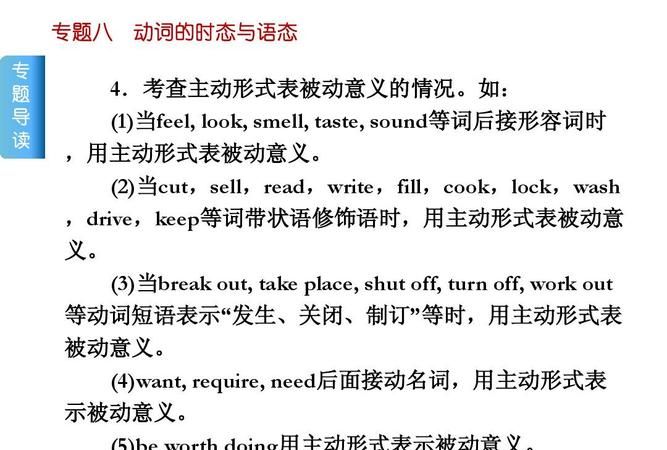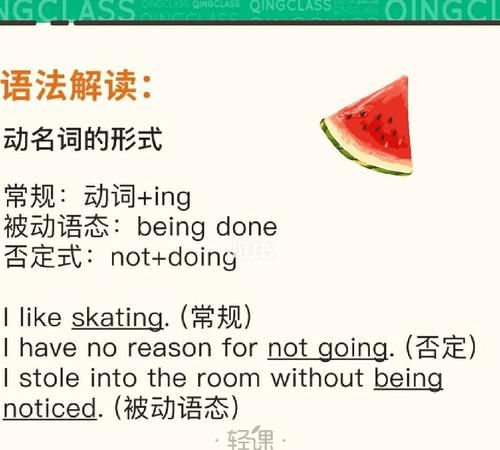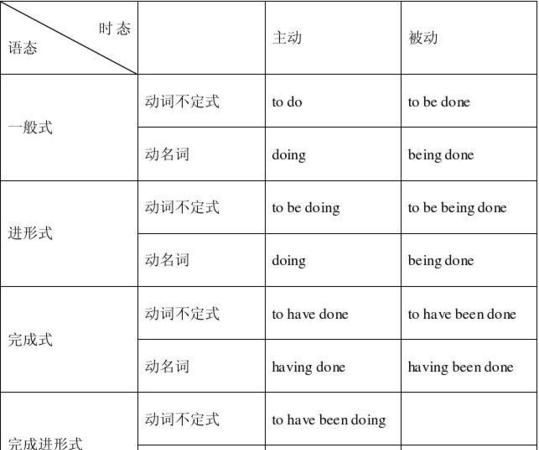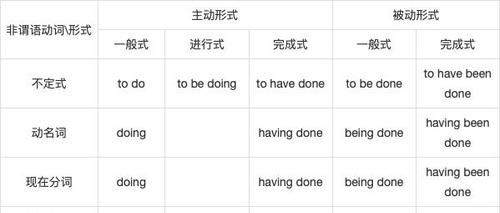本文目录
一下
动名词的逻辑主语原则上是在动名词前用物主代词或名词所有格。如:
His coming late made the teacher angry. 他迟到使老师生气了。
Would you mind my opening the door? 我打开窗户你介意吗?
Please excuse my interrupting you. 请原谅我打断你的话。
有时候老师会讲动名词的逻辑主语就是句子的主语,你的这个例子的主语就可以看成是he

主动形式表示被动意义的词有哪些
某些动词的主动形式表被动含义
英语中有很多动词如act,break,catch,cut,clean, drive,draw, let,lock,open,sell,read,write,wash,wear等,当它们被用作不及物动词来描述主语特征时,其主动形式常用来表达被动含义。另外,像 owe,beat,cook,bake,print,build,make等,有时可以用主动形式表达被动含义。如:
This kind of radio doesn't sell well.这种收音机不太畅销。
The shop opens at eight o'clock.这个商店八点开门。
The pipe does not draw well.这烟斗不太通畅。
These plays act wonderfully.这些剧演得好。
Kate's book reads like an interesting novel.凯特的这本书读起来像本有趣的小说。
注意:主动表被动强调的是主语的特征,而被动语态则强调外界作用造成的影响。如:
The door won't lock.门锁不上。(指门本身有毛病)
The door won't be locked.门不会被锁上。(指不会有人来锁门)
His novels sell easily.他的小说销路好。(指小说本身内容好)
His novels are sold easily.他的小说容易销售。(主要强调外界对小说的需求量大)
6.某些动名词的主动形式表被动含义
1)在need,want,require,deserve和bear等词的后面,动名词用主动形式表示被动含义,其含义相当于动词不定式的被动形式。如:
The house needs repairing(to be repaired).这房子需要修理。
My clothes need washing(to be washed).我的衣服需要洗了。
2)形容词worth后面跟动名词的主动形式表示被动含义,但不能跟动词不定式;而worthy后面跟动词不定式的被动形式。如:
The picture-book is well worth reading.(=The picture-book is very worthy to be read.)这本画册很值得一读。
Such a man as Mr.Smith is not worth helping.(=Such a man as Mr.Smith is not worthy to be helped.)像史密斯先生那样的人不值得帮助。
This plan is not worth considering.(=This plan is not worthy to be considered.)这个计划不值得考虑。
3)某些动词不定式的主动形式表被动含义
a.当nice,easy,fit,hard,difficult, important,impossible,pleasant, interesting等形容词后跟不定式作状语,而句子的主语又是动词不定式的逻辑宾语时,这时常用不定式的主动形式表达被动含义。如:
Japanese is not difficult to learn.日语并不难学。(指日语被学)
The water is unfit to drink.这水不适合喝。(指水被喝)
The piece of music is pleasant to hear.这首音乐听起来很悦耳。(指音乐被听)
This book is easy to read.这本书读起来很容易。(指书被读)
b.当动词不定式在名词后面作定语,不定式和名词之间有动宾关系时,不定式的主动形式表示被动含义。如:
I have a lot of work to do today.我今天有很多工作要做。(work to do指被做的工作)
He has three children to look after.他有三个孩子要照看。(children to look after指孩子被照看)
注意:如果以上句型用动词不定式的被动形式,其含义有所区别。如:
I have some clothes to be washed.我有些要洗的衣服。(衣服不是自己洗)
c.在there be...句型中,当动词不定式修饰名词作定语时,不定式用主动或被动式,其含义没有什么区别。如:
There is a lot of homework to do(to be done).有很多家庭作业要做。
There are some clothes to wash(to be washed).有些衣服要洗。
4)由介词for,on,above,under等构成的短语有时可以表达被动含义。如:
His paintings will be on show tomorrow afternoon.=His paintings will be shown tomorrow afternoon.他的油画作品明天下午展出。
5)表示感官意义的连系动词如smell,feel,taste,look,sound等在句子中常表达被动含义。如:
How nice the music sounds!这音乐听起来多悦耳!
Good medicine tastes bitter.良药苦口。
Our school looks more beautiful than before.我们学校看上去比以前更漂亮了。

英语语法一直是一个令我头疼的问题用英语怎么说
动名词就是加了ing的动词,具有动词的特性,但是实际上当作名词使用。
Learning English is not so difficult
但是你要说的是现在分词的主被动和时态的问题吧。现在分词也是动词加ing
1 现在分词一般式所表示的动作通常与谓语动作词所表示的动作同时发生,有时也可能略早于或迟于谓语动作,但两者之间没有时间间隔;现在分词的完成式主要表示发生在谓语动作之前的动作。如:
I have spent all day looking for you. 我花了一整天找你。
Don’t you sit there doing nothing. 别什么也不干坐在那里。
Not having finished his work,he could not leave the office. 由于工作没干完他不能离开办公室。
Having failed twice, he didn't want to try again. 他已经失败了两次,不想再试了。
2. 现在分词的主动式与被动式
一般式
主动形式doing
被动语态being done
完成式
主动形式 having done
被动语态 having been done
当现在分词的逻辑主语与现在分词为被动关系时,现在分词要用被动式。如:
Who is the woman being operated on? 正在动手术的女人是谁?
The subject having been opened,he had to go on with it. 话题已经开始了,他不得不谈下去。
Having been written in haste, the book has many mistakes. 这书因写得仓促,所以错误不少。

哪些动词用主动形式表被动
哪些动词用作主动表被动
(1)
连用动词用主动表被动:尤其是表示“……起来”的系动词,如sound(听起来),
taste(吃起来),
smell(闻起来),
feel(摸起来),
look,
seem(看起来)等,尽管它在汉语意思含有被动意味,但英语却要用主动形式表示被动含义。如:
绸子摸起来柔软光滑。
误:Silk
is
felt
soft
and
smooth.
正:Silk
feels
soft
and
smooth.
他并不像他看起来那么傻。
误:He
is
not
such
a
fool
as
he
is
looked.
正:He
is
not
such
a
fool
as
he
looks.
(2)
某些不及动词用主动表被动:用作不及物动词的open,
close,
shut,
read,
write,
translate,
wash,
clean,
lock,
sell,
wear,
cut,
cook等,当主语是物,且因该事物本身具有某一固有特点使得谓语动词能以某种方式得以实现或难以实现时,用主动形式表示被动含义。如:
The
book
sells
well.
这本书卖得不错。
The
window
won’t
open.
窗子打不开了。
This
shirt
will
wear
very
long.
这衬衫可以穿很久。
This
cheese
doesn’t
cut
easily.
It’s
too
soft.
这乳酪不容易切,太软了。
(3)
关于let,
blame:不定式to
blame,
to
let等作表语时,用主动表示被动。如:
This
house
is
to
let.
此房出租。
Nobody
is
to
blame
for
it.
谁也不该埋怨。
(4)
几个表示“需要”的动词:在表示“(某物)需要”的need,
want,
require等后的动名词用主动形式表示被动含义。
The
house
wants
painting(=
to
be
painted).
房子需要油漆了。
The
floor
requires
washing(=
to
be
washed).
地板该洗了。
(5)
关于be
worth
doing
sth:在be
worth后的动名词用主动表示被动。如:
His
suggestion
is
worth
considering.
他的建议值得考虑。
This
clock
is
hardly
worth
repairing.
这个钟几乎不值得修了。

以上就是关于动名词主动形式 ,一下的全部内容,以及动名词主动形式 的相关内容,希望能够帮到您。

